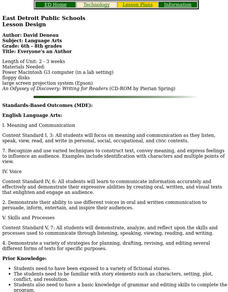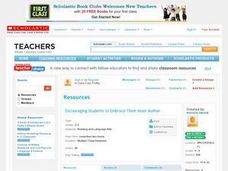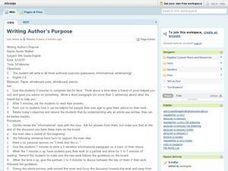Education Development Center
Proof with Parallelogram Vertices
Geometric figures are perfect to use for proofs. Scholars prove conjectures about whether given points lie on a triangle and about midpoints. They use a provided dialogue among fictional students to frame their responses.
Baylor College
Do Plants Need Light?
Turn your classroom into a greenhouse with a lesson plan on plant growth. First, investigate the different parts of seeds, identifying the seed coat, cotyledon, and embryo. Then plant the seeds and watch them grow! Measure the new plants...
Houghton Mifflin Harcourt
Person to Person: Extra Support Lessons (Theme 4)
Authors use many strategies when writing stories. A series of extra support lessons breaks down those strategies, as well as key grammatical and phonics-based concepts to support struggling learners. The last of three lessons offers...
Baylor College
Plant or Animal?
Teach your class about the necessities of life using the book Tillena Lou's Day in the Sun. After a teacher-read-aloud, students make puppets depicting different plants and animals from the story and illustrating the habitat in which...
Baylor College
Air and Breathing
Blow some bubbles and learn how living things need air in the eighth lesson of this series. Young scientists investigate this important gas by observing bubbles and monitoring their own breathing. A simple and fun activity that raises...
Baylor College
Needs of Living Things: Post-Assessment
Assess your class's knowledge of the needs of living things with the final lesson in a series. Given a large piece of paper and coloring utensils, young scientists draw a picture of themselves and a plant or animal of their choosing,...
Warren County Public Schools
Small Group Discussion Questions
Support a class reading of the novel Song of the Trees by Mildred D. Taylor with this series of discussion questions. Covering a variety of topics from character and setting to historical accuracy and symbolism, these questions challenge...
Arizona Department of Education
Area and Perimeter of Regular and Irregular Polygons
Extend young mathematicians' understanding of area with a geometry lesson on trapezoids. Building on their prior knowledge of rectangles and triangles, students learn how to calculate the area of trapezoids and other irregular...
Curated OER
Pi Day: The Other Math Holiday!
Happy Pi Day! This collection of games, experiments, and activities leads participants through an exploration of the many aspects and attributes of that mysterious quantity, pi. Activities range from using statistical experimentation to...
Texas Center for Learning Disabilities
Teacher Templates
Letter by letter, sound by sound, monitor the growth of your emergent readers with these assessment templates. Adaptable to the needs of individual students, these one-on-one assessments focus on children's ability to identify letters...
ReadWriteThink
Persuasive Essay: Environmental Issues
Young environmentalists learn how to craft a persuasive essay about an environmental issue they consider important. After studying the components of a persuasive essay and examining a student model, writers brainstorm possible topics and...
Curated OER
Student Reading Log
In this reading log worksheet, learners fill in the title, author, reading level, date, and have the teacher initial each entry. They complete the information for 12 books.
Curated OER
A Plump and Perky Turkey
Help readers recognize elements in a story. They will use pictures and text to gain meaning from written material. Have learners listen to the story A Plump and Perky Turkey and participate in a discussion. They recognize the Internet...
Curated OER
Text Features of a Story
Bring the enjoyable story of Anansi and the Moss-Covered Rock by Eric A. Kimmel to your young readers. After reading the story as a class, students answer questions about a reading and make a graphic organizer. They make predictions,...
Curated OER
Students Get Animated: Make Existing Lessons Move and Motivate Students
Students study the chemical elements in a computer generated cartoon format. In this computer animation and chemistry lesson, students learn how to animate using computer programs. Students use animation to learn about the Periodic Table...
Curated OER
Imitating An Author's Style
Students explore author's style. In this literature lesson, students read and take notes on a short story of their choice. Students write an original short story imitating the author's style.
Curated OER
Tomie dePaola Author Study
Using Tomie de Paola's books for an author study can get students thinking about characters, plot, and illustrations.
Curated OER
World Literature-Teaching Asian, African & Latin American Authors
World Literature lesson plans for high school students can lead to a greater cultural awareness and appreciation of literature.
Curated OER
To Entertain
Second graders consider the author's purpose for writing a text. In this author's purpose lesson plan, 2nd graders discuss reasons why author's write a book and how it can often be for entertainment. Students read a book, provide two...
Curated OER
Author's Purpose
In this worksheet on determining the purpose of writing, students read 3 short paragraphs and choose whether they were written to persuade, inform or entertain.
Curated OER
Everyone's an Author
Students examine variety of written pieces of quality fiction, discuss what different story elements are present and how those elements make stories as effective as they are, and create a class story.
Joel Heck
The Life of C.S. Lewis
C.S. Lewis is considered one of the greatest Christian writers of all time. A slide show presentation provides an overview of his life and work. It includes multiple perspectives to give your class a well-rounded view of an amazing author.
Curated OER
Encouraging Students to Embrace Their Inner Author
Everyone is a writer! Youngsters compose an original piece of writing. In this writing lesson, they come up with their own idea for a piece of writing, revise it, and then publish it with illustrations. This lesson includes three...
Curated OER
Writing Author's Purpose
Write in all three authorial purposes (persuasive, informational, entertaining) with this lesson. Young writers consider a time when a friend of theirs helped them out and gave them advice on something. They write a short paragraph (no...

























